1. Max Power
How much power can a generator put out?Power is the main criterion when choosing an electric generator. If you have a small private house and you are looking for a 3-5 kilowatt unit, it does not matter what fuel it will run on. The difference becomes visible at values above 10. Among gasoline models, this is already a rarity, and it is almost impossible to find stations for 20-30 kilowatts. But for diesels, such figures are quite normal. Moreover, for a diesel unit, the figure of 10 kilowatts is generally not high. Simply put, if you need a generator with the highest possible power rating, then the choice is definitely a diesel one.
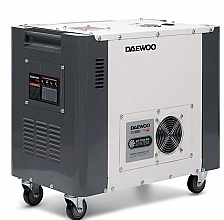
Daewoo Power Products DDAE 9000SSE
Maximum security
2. Resource (motor hours)
How long will the generator run without breakdowns?This parameter is individual for each manufacturer and specific model. But there is a generalized idea about the duration of the operation of units on different fuels. Gasoline will work on average from 400 to 4,000 hours. The figure is impressive, but not for a diesel. Here the values already start at 3 thousand and stop at about 40. The secret lies in the principle of operation of the engines. Diesels are more reliable. Any car owner will confirm this to you as well.Of course, the presented parameters are conditional and can vary significantly depending on a number of factors. Here we are talking about the overall indicator of reliability and duration of work.
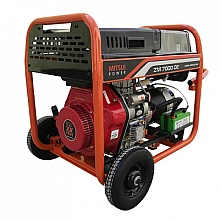
Mitsui Power ECO ZM7000-DE
The best ratio of price and quality
3. Dimensions and weight
How much do generators weigh and what are their dimensions?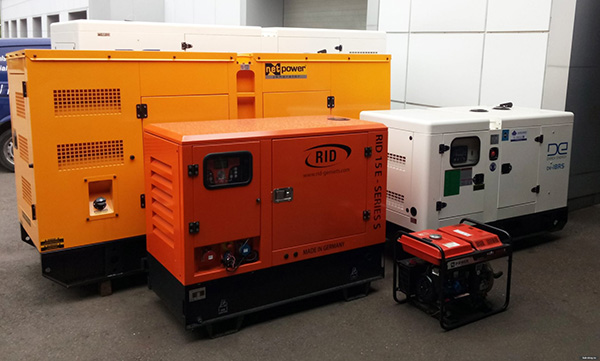
Here it is relevant to compare two models of the same power. A diesel unit will weigh more than a gasoline unit. Same story with dimensions. This is due to the design features of the motors. For example, a generator of 5 kilowatts of power, running on diesel fuel, will weigh an average of 100 kilograms. While the gasoline analogue is about 70. For clarity, consider several popular models:
Generator type | Model | Weight, kg) |
Petrol | Champion GG6500 (5 kW) | 72 |
Diesel | Champion DG6501E (5 kW) | 99 |
Petrol | Fubag BS 5500 (5 kW) | 77 |
Diesel | Fubag DS 7000 DA ES (5 kW) | 103 |
The difference is obvious. That is why almost all diesel engines are equipped with wheels, handles and other options that make moving easier. In addition, the gasoline will be much smaller in size, even if placed in a fully insulated housing.
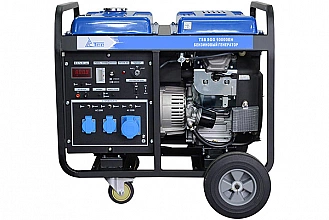
TSS SGG-10000 EH
high power
4. Noise pollution
How noisy are the engines?If you have a small private house and do not have a separate building to accommodate an electric generator, it is better to give preference to gasoline models. During operation, they make much less noise than their diesel counterparts. We also note that gasoline units do not have a low volume level.
To reduce the volume of the generator, it is necessary to put a rubber hose on the exhaust pipe, and place its free end in a bucket of water.
On average, gasoline models, for example, at 7 kilowatts, give out 80-100 decibels, which is quite loud and obviously it will not work to place them in the next room. But with the general equal characteristics, the diesel engine will work one and a half times louder. And this is provided that almost all of them are equipped with powerful mufflers.
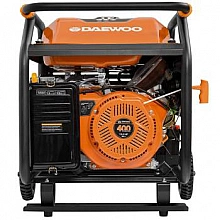
Daewoo Power Products GDA 8500E-3
Ability to work in 380 volt mode
5. Price
How much do generators with different types of fuel cost?Price is a relative concept, since it can vary greatly depending on the manufacturer, brand and quality of the unit itself. To make the comparison relevant, let's take two models from the same manufacturer and with the same power parameters. It can be any brand, from the most budgetary to the top, the main thing is that it produces both models.
Generator type | Model name (brand) | Price (Shop All Tools) |
Petrol | Fubag BS 5500 | 47 700 |
Diesel | Fubag DS 7000 DA ES | 85 500 |
Petrol | Hyundai HHY 7020FE | 59 000 |
Diesel | Hyundai DHY6000SE-3 | 123 000 |
And so, a diesel station will always cost more, and much more. Sometimes the gap reaches two or more times.Gasoline units are much cheaper, which makes them more popular among ordinary buyers.
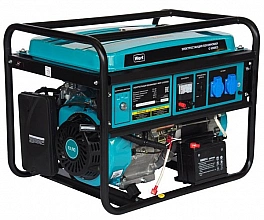
Wert G6500
Attractive price
6. Service
How often is maintenance required and how much does it cost?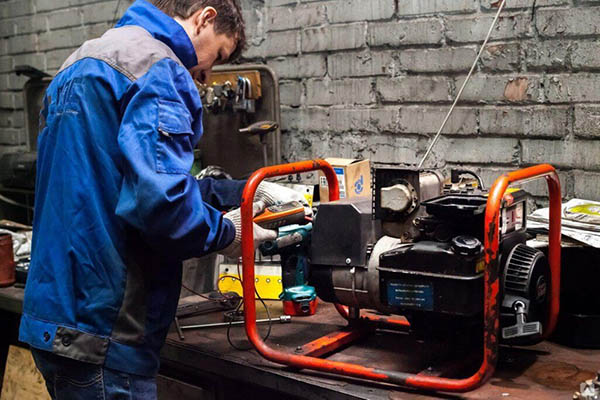
As we have already said, a diesel generator is more reliable and outperforms a gasoline one in terms of the duration of its working life. Accordingly, it requires less maintenance. Moreover, it is limited to a simple replacement of the fuel filter. No need to climb anywhere, as well as disassemble something.
Gasoline models use a carburetor for fuel injection. This is one of the weakest modules, most often requiring repair and maintenance. And you will have to do scheduled maintenance more often. Diesel definitely wins here, but only until the conversation turns to the cost of such work. Eliminating even the smallest damage will be very expensive. Also, if you use the services of masters, they will charge you a much larger amount for servicing a diesel engine. This round is definitely a draw.
7. Economy
How much fuel do generators use?Traditionally, a diesel engine is considered more economical. Fuel is consumed less, respectively, the autonomy of such a device will be higher. If we compare prices for the fuel itself, then diesel fuel costs about the same as AI-95 gasoline. Consider, for example, several popular models:
Model | Fuel type | Fuel consumption per hour |
Fubag DS 5500 A ES | Diesel | 2.45 |
Fubag BS 5500 | Petrol | 3.1 |
Hyundai DHY 7000LE-3 | Diesel | 2.6 |
Hyundai HY7000SE | Petrol | 3.4 |
Most gasoline generators are fueled with AI-92 fuel, which is a little cheaper, but just not much. In terms of efficiency, the diesel unit certainly wins.
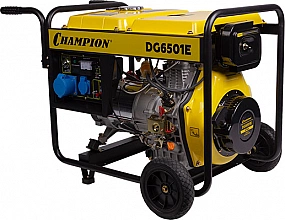
Champion DG6501E
The cheapest diesel
8. Safety
Which generator is safer to operate?The main danger associated with the operation of generators is fuel ignition. Gasoline can ignite even from a small spark, or if it hits a hot surface. That is why it is necessary to monitor the condition of the fuel system of a gasoline unit especially carefully. With solar, things are easier. Even the cleanest fuel is not so easy to ignite. When it falls on a hot part, it evaporates. Yes, this produces harmful fumes, but if the generator is located in a separate room, they will not cause harm to health. In terms of safety, diesel looks definitely more attractive.
9. Launch and operation
Which generator is easier to handle?
Both those and other models can be equipped with electronic start. To start the unit, you just need to press the button. But this is under favorable conditions. If the ambient temperature is below zero, problems may arise with a diesel engine. Diesel fuel begins to thicken already at -5, and at -30 it completely freezes. Top models are equipped with a special device that warms up the fuel before starting. But you can still forget about the quick start of the motor.
With petrol models, this problem will not arise. The motor starts at any temperature, even extreme.The generator does not depend on the season and weather conditions, respectively, it can be safely placed in an unheated room, which is certainly a plus.
10. Continuous work
Which generator will run the longest without rest?Each generator has its own cooling system. In budget models, it is airy, in top models it is liquid. But even the best gasoline unit requires rest from time to time. The parameter of continuous operation is indicated in the technical documentation of a particular model, but we note that it will not work to drive it continuously. Sometimes the generator needs to rest, which is why they are rarely used in places where constant autonomy is needed.
Diesel definitely wins here. He is able to work for a long time without stopping at all. Often the engine is turned off only for scheduled maintenance or repairs. Even the fuel is poured with the engine running.
11. Comparison results
The best generator will be determined by the average score for all comparison criteriaGenerator type | Evaluation (sum of scores by criteria) | Number of wins by criteria | Category winner |
Diesel | 4.6 | 5/10 | Maximum power; Resource; Profitability; Safety; Continuous work |
Petrol | 4.3 | 4/10 | Dimensions and weight; Noise level; Price; Launch and operation |
According to the set of criteria, the diesel engine wins, although the gap between the contestants is minimal. Gasoline and diesel models have their pros and cons, so it's hard to name a clear winner. The choice depends on the requirements for the unit.
You should choose a gasoline unit if you are important:
- Ease of operation;
- The price of the generator itself and its maintenance;
- Light weight and compact size;
- Relatively quiet operation.
The diesel generator is suitable for those who care about:
- Safety;
- Profitability;
- Long resource;
- Maximum autonomy.








